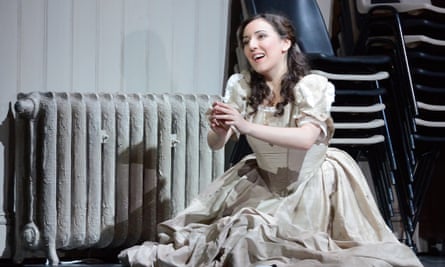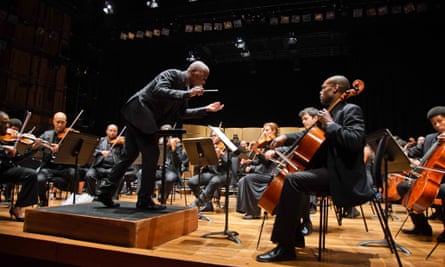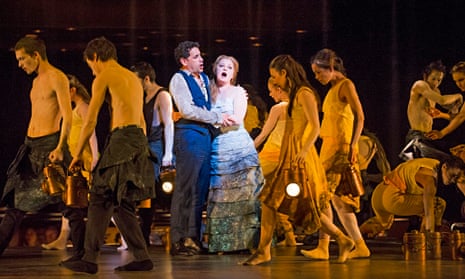At first glimpse it was hard to see how a nearly pitch-dark stage with an orchestra on it and the key soloist seated in a metal stacking chair could turn into a full-scale production worthy of launching the Royal Opera House’s new season. That it did, surprisingly and miraculously, is credit to the co-directors, John Fulljames and the Israeli choreographer Hofesh Shechter, as well as to the combined forces of the conductor John Eliot Gardiner, his English Baroque Soloists and Monteverdi Choir, the cast of three (Juan Diego Flórez, Amanda Forsythe and Lucy Crowe) and Shechter’s own dance company – most of whom were on stage much of the time, song, dance, drama and music folding into one in constant flux, always a coherent whole.
Gluck’s Orphée et Eurydice (1774), as in any telling of the Orpheus myth, is about the power of music. The orchestral and choral writing, you could even argue, is the best bit, especially in this later, rarely performed French version of Gluck’s more concise Italian original (Orfeo ed Euridice). With some 45 minutes of dance music, as well as an overture and countless scurrying interjections, the English Baroque Soloists – hydraulically rearranged, rising and falling before our eyes to be below, above or at stage level – were breathtaking, tireless and versatile.
The trio of on-stage trombones, sour, black and infernal in their gutsy outbursts, deserve their own rosettes. The Monteverdi Choir, dressed in subfusc, worked seamlessly with the Hofesh Shechter Company, who were variously hairy half-naked Furies or nymph-like Blessed Spirits. The choreography, loose-limbed, furious, funky, punky and expressive, conveyed grief, anger and optimism. Where singing ended, dance began.
In the Italian Orfeo, Gluck intended his lead role to be sung by an alto or soprano castrato (illegal in Italy after 1870 and now taken by countertenors, or mezzos). Orphée, however, is for haute-contre, the rare, high tenor voice of the kind the Peruvian superstar Juan Diego Flórez possesses. At the start, as the chorus mourns his loss, he yelps with high, whimpering howls of “Eurydice”, to terrible and moving effect. Yet his performance was admirably cool, agonised at the loss of Eurydice (the warm-voiced Lucy Crowe), trepidatious at the promise that his lyre-playing would restore her from the underworld. In the ROH’s reading, his anxiety is justified and Gluck’s mawkish happy ending remains rewardingly ambiguous.
As for the staging, Conor Murphy (designer) and Lee Curran (lighting) retained the opening, unadorned simplicity, encompassing all beneath acoustically sympathetic and adaptable wooden panels. At times Flórez sang in a single torch-beam of light, as if a world beyond was trying to reach him in his darkness. At others, one large hole in the canopy gave way to dozens of small ones, a kind of celestial colander with shafts of light pushing through – to jumble metaphors as befits this eclectic work. For a Gluck doubter – yes, I admit – the whole evening was a breakthrough: I’d return immediately. The response, for Gardiner and his players especially, was thunderous. The bar is set high for the rest of the ROH season.

Composed by an Italian, premiered in Paris and set in an England of Roundheads and Cavaliers, I puritani (1835) was Bellini’s last opera. Months after its premiere the prodigious composer with a gift for song was dead, aged 33. The backdrop of I Puritani may be politics, but love and madness are at its heart.
In her new staging for Welsh National Opera’s Madness season, Annilese Miskimmon has updated the action to her home city of Belfast in the mid-70s. In Leslie Travers’s designs, lit by Mark Jonathan, Orangemen prepare for the marching season in an echt gloomy church hall complete with tea hatch, union flags and fluorescent strip lighting. You can smell the Troubles just by looking.
The problem, though Miskimmon cleverly stops it being any such, is that Elvira’s madness pushes sectarianism to the side. Believing her lover to have gone off with a mystery woman, Elvira at once succumbs to feverish insanity. This section is conceived as hallucination or dream. Now fragile and Ophelia-like, Elvira drifts around in puritan bridal gown and flowers instead of that nasty drab blue suit. Her Catholic lover, Arturo (Barry Banks) abandons beard, nylon shirt and flared jeans in favour of Cavalier curls, velvet and lace. It sounds awful but it works. Miskimmon takes some liberty with the ending, which you may object to. I did not, and I won’t spoil it by telling.
Elvira is superbly sung with nimble, silvered coloratura by the Italian soprano Rosa Feola. Her gift is to deliver Bellini’s crazed scurries of high notes and ornaments with resilience and effortless pliancy.
Under the idiomatic conducting of the Italian Carlo Rizzi, WNO’s former music director, this was a stirring evening, with crisp high-tenor agility from Banks (Flórez sings this role, too) and sturdy support from David Kempster as the dogged protestant Riccardo Forth, and Wojtek Gierlach as Sir Giorgio. The spirited WNO chorus and orchestra were on blazing form. If never the deepest or the most shattering of operas, I Puritani revels in the possibilities of the human voice. Catch it on tour until mid-November; Linda Richardson takes over from Feola on 27 October.

Can anyone really still believe classical concerts remain trapped in a cobwebbed past? Last weekend two out-of-the-ordinary ensembles played Beethoven’s Seventh Symphony. The Multi-Story Orchestra – which does what it says on the tin – closed a daring season with an “immersive” event using four levels of Peckham car park. I had to miss it to be at the Southbank for the debut performance by Chineke!, Britain’s first black and minority ethnic (BME) orchestra founded by the bass player Chi-chi Nwanoku. Violinist Tai Murray led, igniting each note with fiery energy. Wayne Marshall conducted. Standards were formidable.
In addition to Beethoven and Brahms, they performed Coleridge-Taylor’s buoyant Ballade and a short, elegiac string piece written in 1999 by Philip Herbert in memory of Stephen Lawrence. The 18 players represented the murdered boy’s age at his death. (The concert fell on what would have been his 41st birthday.)
This music’s wistfulness brought to mind the string writing of Vaughan Williams and Finzi. “Why these English sounds?” Herbert asks in his programme note, replying: “These are sound worlds that I have assimilated from my musical education in Britain where I was born.” By the end of the concert the capacity all-colours, all-ages audience was yelling for more.
Star ratings (out of five)
Orphée et Eurydice ****
I puritani ****
Chineke! *****
Orphée et Eurydice is at the Royal Opera House, London WC2 until 3 October

Comments (…)
Sign in or create your Guardian account to join the discussion